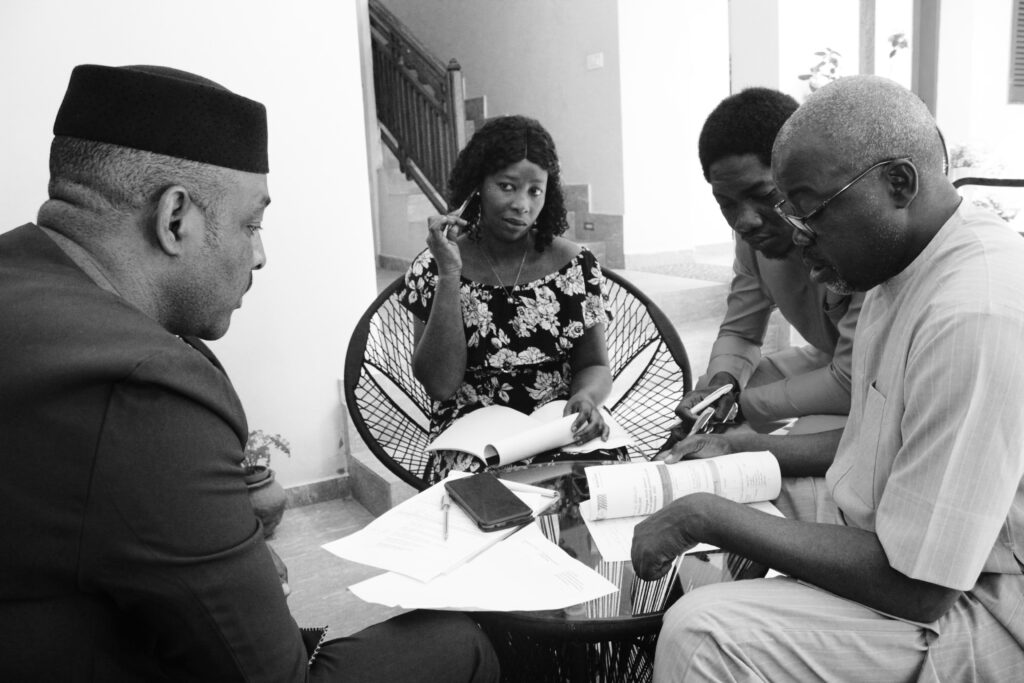Dialogue

Au NIMD, nous pensons que la démocratie commence par le dialogue. Nous savons par expérience que lorsque les différents groupes politiques se réunissent pour dialoguer - entre eux, avec la société civile ou avec la population en général - un pays a beaucoup plus de chances de mettre en œuvre des réformes, de forger une paix durable et de cultiver une démocratie prospère et inclusive.
- Nos objectifs
- Notre approche
- Exemples pratiques
- Nos collaborations
Nos objectifs
Grâce à nos initiatives de dialogue, nous visons à instaurer la confiance, la collaboration et le consensus entre les partis politiques et les autres acteurs politiques. En outre, nous favorisons la réactivité politique et la confiance dans les institutions publiques en établissant des liens entre les hommes politiques et les personnes qu'ils représentent.
L'instauration de la confiance est au cœur de tous nos travaux sur le dialogue. Qu'il s'agisse de lutter contre la polarisation en rassemblant les gens au-delà des clivages idéologiques, de cultiver des espaces inclusifs où les voix de toute la société peuvent être entendues sur un pied d'égalité ou d'encourager la recherche d'un consensus en vue de l'adoption d'une nouvelle législation inclusive, notre travail repose sur une conviction commune : En rassemblant les gens dans un cadre ouvert et respectueux, nous pouvons renforcer la confiance qui sous-tend une culture démocratique forte.
Aujourd'hui, nous pensons que notre travail de dialogue est plus crucial que jamais, car nous constatons une tendance mondiale au rétrécissement de l'espace démocratique, avec une domination accrue d'un parti unique et un affaiblissement des forces d'opposition. Dans ces contextes, les plateformes de dialogue du NIMD offrent des espaces sûrs où tous les acteurs politiques et civiques peuvent exprimer leurs points de vue. Cet aspect est crucial pour la démocratie, car il garantit que les différents points de vue sont pris en compte dans les processus de prise de décision.
Notre approche
Qu'est-ce qui fait que notre dialogue fonctionne ?
Le dialogue est une forme de communication très particulière, fondée sur le respect mutuel, l'écoute active et la recherche du consensus. Alors que la négociation ou le débat visent à mettre en évidence les différences, le dialogue instaure la confiance en guidant les participants vers un terrain d'entente.
Ce qui rend notre approche du dialogue politique unique, c'est notre engagement en faveur de l'impartialité : nous donnons à tous les acteurs concernés un siège à la table et une voix égale. Toutes les décisions sont prises sur la base d'un consensus et non d'un vote. Pour de nombreux participants au dialogue, il s'agit là d'un grand changement par rapport au parlement ou à d'autres institutions politiques. En donnant à chacun une voix égale, nous encourageons les participants à établir la confiance au-delà des clivages idéologiques.
Indépendamment du niveau de formalité, de la structure ou des participants, chaque dialogue de la NIMD a certains points communs. Par exemple, les dialogues sont la propriété des participants, qui assument la responsabilité conjointe du processus et de ses résultats. Il leur incombe de veiller à ce que le processus de dialogue s'inscrive dans la durée et ait un impact durable.
Apprendre à travers notre réseau
Le succès de notre dialogue dépend également de l'expertise et de l'impartialité de nos facilitateurs. Ces facilitateurs qualifiés veillent à ce que chaque intervention de dialogue du NIMD réponde aux besoins et aux objectifs spécifiques des personnes avec lesquelles nous travaillons, et tienne compte de la dynamique politique de leur pays.
Dans le cadre de leur travail dans différents contextes à travers les pays du programme du NIMD, beaucoup de nos facilitateurs sont confrontés à des problèmes et des défis similaires. C'est pourquoi le NIMD a exploité la puissance de son réseau mondial pour mettre en place le réseau Baobab, un réseau international de facilitateurs du dialogue politique.
Le réseau Baobab s'efforce de favoriser les échanges entre les facilitateurs de dialogue par la formation, le mentorat, l'échange entre pairs et les possibilités d'apprentissage.
Nos interventions de dialogue
Nous avons six interventions de dialogue caractéristiques, que nous déployons après une analyse et une consultation approfondies de nos groupes cibles :
Dialogue entre partis politiques
Notre intervention traditionnelle de dialogue, dans laquelle le NIMD ou ses partenaires facilitent un espace sûr pour le dialogue entre les représentants des partis politiques. Ces plateformes se réunissent régulièrement, mais peuvent avoir des objectifs différents, allant de l'instauration d'une confiance et d'une collaboration à long terme à une intervention à court terme, en passant par l'obtention de résultats concernant une question, un thème ou un texte législatif particulier.
Dialogue entre acteurs politiques
L'approche est similaire à celle du dialogue avec les partis politiques, mais elle inclut des parlementaires, des partis d'opposition qui ne siègent pas encore au parlement, des fonctionnaires, des caucus, des personnalités du gouvernement local et des organisations de la société civile actives dans la sphère politique.
Dialogue multipartite
Au-delà des personnes directement impliquées dans le processus politique, ces dialogues rassemblent divers groupes de la société qui ont un intérêt dans le processus politique. Il peut s'agir de syndicats, de groupes de pression, de mouvements de protestation et d'entreprises. Les dialogues multipartites sont généralement organisés autour d'une question, d'un objectif ou d'une finalité spécifique et se déroulent dans un laps de temps déterminé.
Dialogue intergénérationnel entre partis politiques
Ces dialogues réunissent de jeunes membres de partis politiques et des dirigeants politiques de haut niveau, issus de différents partis politiques. En plus d'offrir aux jeunes une occasion importante de créer des réseaux, ces dialogues contribuent également à renforcer la confiance et la compréhension mutuelle, à surmonter les stéréotypes et à réduire la polarisation entre les générations dans le domaine politique.
Dialogue informel
Tous les contextes ne nécessitent pas une plateforme de dialogue formelle et structurée avec des paramètres définis. Dans ce cas, le NIMD ou ses partenaires peuvent faciliter des rencontres informelles au cours desquelles les acteurs politiques ou civiques échangent des idées et renforcent la confiance dans un environnement convivial et non conflictuel. Il n'y a pas d'engagement formel et l'objectif principal est d'instaurer la confiance et de jeter les bases d'une collaboration future.
Assistance au dialogue
Dans les cas où un gouvernement ou d'autres acteurs (étatiques ou civiques) ont mis en place leur propre initiative de dialogue, le NIMD est en mesure de fournir un soutien technique, logistique et thématique ainsi qu'une expertise pour contribuer au succès de l'initiative.
Le NIMD peut choisir d'utiliser une ou plusieurs de ces interventions dans le cadre d'un programme, en fonction du contexte du pays. Notre suivi constant nous permet d'évoluer et d'adapter nos approches afin de nous assurer qu'elles restent efficaces dans des paysages politiques qui changent souvent rapidement. Qu'il s'agisse de faire naître l'espoir par le dialogue au Myanmar ou d'identifier le besoin d'un dialogue intergénérationnel en Éthiopie, nos équipes renforcent et ajustent en permanence leurs efforts. Cette adaptabilité garantit que notre travail de dialogue répond efficacement aux réalités de chaque pays.
Soutenir une législation inclusive par le dialogue
La démocratie inclusive nécessite des lois inclusives, qui garantissent l'égalité des chances des citoyens en matière de participation aux élections.
Les lois inclusives ont un effet positif immédiat sur les systèmes démocratiques. Elles peuvent déclencher des changements systémiques visant à renforcer l'autonomie des groupes sous-représentés et à supprimer les obstacles à la participation politique. Prenons l'exemple des lois électorales qui prévoient un système de quotas pour les femmes, les jeunes ou les populations autochtones. Elles renforcent le caractère inclusif des élections et donnent à ces groupes sous-représentés la possibilité d'influencer directement la prise de décision politique.
Un objectif important de nos initiatives de dialogue est de soutenir l'adoption d'une législation inclusive. Nos initiatives de dialogue visent à instaurer la confiance, la collaboration et le consensus entre les acteurs politiques et les autres parties prenantes. En travaillant ensemble sur le long terme et en s'écoutant vraiment les uns les autres, ces groupes peuvent proposer de nouvelles lois, de nouveaux règlements et des changements de politique qui vont dans le sens des intérêts de la population en général.
La NIMD facilite également les dialogues multipartites autour de la réforme législative, en réunissant les partis politiques, les membres du Parlement, les organes de gestion des élections et la société civile.
Et il ne s'agit pas seulement d'avoir les bonnes lois sur le papier. En plus de notre travail de dialogue, nous travaillons en étroite collaboration avec les organes de gestion des élections (OGE) afin de garantir une mise en œuvre efficace de lois électorales inclusives. Par exemple, nous aidons les organes d'administration des élections à planifier leurs actions de manière stratégique en fonction du cycle électoral, afin que leur travail soit opportun et efficace.
Dialogue dans les environnements fragiles et touchés par des conflits
Lorsqu'un pays est confronté à des problèmes de sécurité, l'environnement politique peut devenir profondément polarisé, créant des clivages importants. Ces divisions entraînent souvent un manque de confiance entre les acteurs politiques, ce qui peut compliquer les efforts de résolution des conflits.
Dans les situations les plus conflictuelles, où la confiance est la plus nécessaire, les stratégies du NIMD pour le dialogue avec les partis politiques deviennent inestimables. Pour instaurer efficacement la confiance, il faut non seulement comprendre le contexte institutionnel et les acteurs concernés, mais aussi faire preuve d'une diplomatie habile et d'une facilitation experte.
S'appuyant sur son bilan et ses nombreuses années d'expérience en matière de dialogue politique au plus haut niveau, le NIMD et son réseau d'experts internationaux en facilitation et de partenaires locaux de confiance facilitent le dialogue entre les parties opposées, en investissant dans le renforcement de la confiance politique et dans l'instauration d'une paix durable.
Et les bénéfices sont visibles dans le monde entier. En renforçant la paix et la confiance au sein des pays, la NIMD s'attaque directement aux conflits qui contribuent à des problèmes mondiaux tels que la migration irrégulière et l'instabilité économique.
Exemples pratiques
Rencontrer l'équipe
 Salima Ahmadou
Conseiller en programmes et connaissances pour l'Afrique de l'Ouest
Salima Ahmadou
Conseiller en programmes et connaissances pour l'Afrique de l'Ouest

